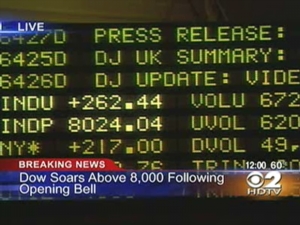 Play Video CBS 2 New York – MoneyWatch: Dow Soars 250 Pts, Above 8,000
Play Video CBS 2 New York – MoneyWatch: Dow Soars 250 Pts, Above 8,000By SARA LEPRO, AP Business Writer
NEW YORK – Investors dove into stocks Thursday, extending a rally that gave the Dow Jones industrial average its best four weeks since 1933.
Stocks rose across the board in heavy trading following an accounting rule change that will help banks pare their losses and after commitments from world leaders to toughen regulatory oversight of financial institutions.
The Dow broke through 8,000 for the first time since Feb. 9 but ended slightly below that level ahead of the government's employment report Friday that could easily upset the market if it comes in below forecasts — or send prices rocketing higher if it's better than expected.
The Dow is now up 20.4 percent over the last month, its biggest percentage gain in a four-week period since the spring of 1933. Bits of good news about the economy in recent weeks, including better-than expected-numbers on housing and manufacturing, have given investors more reasons to buy.
The Dow gained 216.48, or 2.8 percent, to close at 7,978.08, after earlier rising as much as 314 points.
"People are worried about this (employment) report, so the last hour we sold off," said Richard Campagna, managing director and chief investment officer of Pasadena, Calif.-based investment manager 300 North Capital.
Broader market indicators also rose sharply. The Standard & Poor's 500 index gained 23.30, or 2.9 percent, to 834.38. The Nasdaq composite index rose 51.03, or 3.3 percent, to 1,602.63.
Industrial and consumer discretionary stocks picked up speed Thursday while demand for safe-haven assets like gold and Treasurys plummeted.
"Everyone is in a buying mood," said Eric Ross, director of research at brokerage Canaccord Adams. "Everyone is feeling good. ... A lot of this is simply confidence."
The market has managed to shrug off some negative data on employment recently such as initial claims for jobless benefits. But a surprisingly bad report on the March job market could easily stifle the market's growing optimism. Economists predict the report will show a loss of 654,000 jobs following a drop of 651,000 jobs in February, which was a record third straight month of job losses above 600,000. The unemployment rate is expected to rise to 8.5 percent from 8.1 percent in February.
Banking shares got a significant boost after a rulemaking body for the accounting industry relaxed financial reporting rules that force banks to value their assets at current market prices.
The change in "mark-to-market" accounting rules, which should help banks reduce losses, sends another lifeline to the troubled financial industry. Many investors believe financial stocks, which have largely carried the market's four-week rally, are a gauge of when the economy is turning.
Among the biggest advancers in the financial industry Thursday were Wells Fargo & Co., which jumped 85 cents, or 5.9 percent, to $15.33, and Goldman Sachs Group Inc., which rose $3.93, or 3.6 percent, to $114.22. Regional banks also rose sharply.
The conclusion of a one-day summit in London of the world's finance ministers sent stocks to their highest levels in early afternoon trading. While the G-20 leaders did not satisfy calls for new stimulus measures, they pledged an additional $1.1 trillion in financing to the International Monetary Fund and declared a crackdown on tax havens and hedge funds.
Another positive indicator on the economy also lifted sentiment on Wall Street. Factory orders posted a large increase in February, coming on the heels of better-than-expected readings on pending home sales, manufacturing activity and auto sales the day before.
In other trading, the Russell 2000 index of smaller companies jumped 21.03, or 4.9 percent, to 450.19.
For every three stocks that fell, nearly nine stocks rose on the New York Stock Exchange where consolidated volume came to 7.36 billion shares.
The Dow is still down about 9 percent for the year, while the S&P 500 is down nearly 8 percent. The Nasdaq is up 1.6 percent.
While analysts have warned that the market could retest the lows hit early last month, there's no doubt a growing sense on Wall Street the economy, at least stateside, might be bottoming out.
"The market mindset is: OK, we're not in a tailspin," said Jack A. Ablin, chief investment officer at Harris Private Bank.
The benchmark 10-year Treasury note fell nearly 1 point, sending its yield up to 2.76 percent from 2.66 percent late Wednesday. The dollar fell against other major currencies after the European Central Bank cut its key interest rate by less than expected. Gold prices also fell.
Oil prices benefited from the better-than-expected economic news. Light, sweet crude jumped $4.25 to settle at $52.64 a barrel on the New York Mercantile Exchange.
Overseas markets also logged big gains. Japan's Nikkei stock average rose 4.4 percent, while Hong Kong's Hang Seng index jumped 7.4 percent. In Europe, Britain's FTSE 100 rose 4.3 percent, Germany's DAX index rose 6.1 percent, and France's CAC-40 rose 5.4 percent.



No comments:
Post a Comment